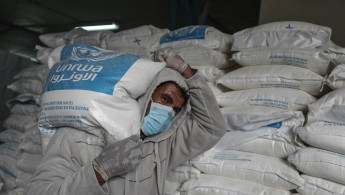Qatar Charity donates $1.5 million to UN agency for food aid to Gaza
A Qatar-based NGO on Monday donated $1.5 million to a UN agency which provides food assistance programmes to the besieged Gaza Strip.
The United Nations Relief and Works Agency for Palestine Refugees in the Near East (UNRWA) provides 1 million Palestinian refugees in Gaza with food assistance.
Marc Lassouaoi, UNRWA Chief of Donor Relations, thanked Qatar Charity for their contribution, noting their "generosity and continuous support towards UNRAW and the Palestine refugees."
The contribution will assist UNWRA in the coastal enclave, the agency said, whose work is conducted by 13,000 staff, most of whom are Palestinian refugees themselves, across eight refugee camps.
During the Covid-19 crisis, this has encompassed support for families in the form of home delivery of food aid and medication to mitigate the spread of the virus.
UNRWA supports millions of Palestinian refugees across the Middle East, including in Jordan, Lebanon, Syria, the West Bank and Gaza.
Read also: UN agency for Palestinian refugees launches urgent coronavirus appeal
The agency is funded almost entirely by voluntary contributions. Two years ago, the US halted funds, estimated to be around $360 million annually, severely impacting UNRWA’s operations.
Jamal al-Khoudary, chairman of the Popular Committee to End Gaza’s Seige, told Andalou Agency that a "a genuine decline" in support from donors had "serious repercussions on the Palestinian refugees in Gaza, the West Bank, Jerusalem and other Arab states."
Humanitarian conditions in the Gaza strip remain dire. Among non-refugees, poverty and food insecurity stand at 54 and 68.5 percent respectively, according World Food Programme estimates.
Israel’s land and sea blockade, imposed since Hamas’ takeover in 2007, have compounded these vulnerabilities for the besieged population.
Follow us on Facebook, Twitter and Instagram to stay connected





 Follow the Middle East's top stories in English at The New Arab on Google News
Follow the Middle East's top stories in English at The New Arab on Google News


